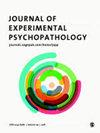认知偏差和负面生活事件在预测儿童和青少年后期抑郁症状中的作用
IF 1.9
4区 医学
Q4 PSYCHIATRY
引用次数: 0
摘要
认知模型认为,注意力(AB)和解释(IB)方面的负面认知偏见会导致抑郁症的发作。这是第一项在没有精神障碍的年轻人样本中检验这一假设的前瞻性研究。参与者为61名9-14岁的无精神障碍青年。在基线(T1),我们测量了AB(被动观察任务)、IB(扰乱语句任务)和自我报告的抑郁症状。30个月后(T2),我们测量了精神障碍的发作、抑郁症状和生活事件(父母和孩子报告)。样本包括父母有(n=31)和没有(n=30)父母抑郁症的孩子。T2时的抑郁症状由IB预测(ß=.35,p=.01),而T1时的AB预测(ł=.05,p=.72)。这种影响在经历过多次负面生活事件的儿童中最强(F2,48=6.0,p=.018,ΔR2=.08)。IB对T2的抑郁症状的预测并不高于T1的抑郁症状(ß=0.21,p=.13)。这些发现表明IB(而不是AB)在抑郁症的病因中起着重要作用。修改IB可能对青少年抑郁症有预防作用,尤其是对经历过负面生活事件的青少年。这项前瞻性研究为未来的实验研究提供了重要的基础。本文章由计算机程序翻译,如有差异,请以英文原文为准。
The role of cognitive biases and negative life events in predicting later depressive symptoms in children and adolescents
Cognitive models propose that negative cognitive biases in attention (AB) and interpretation (IB) contribute to the onset of depression. This is the first prospective study to test this hypothesis in a sample of youth with no mental disorder. Participants were 61 youth aged 9–14 years with no mental disorder. At baseline (T1) we measured AB (passive-viewing task), IB (scrambled sentences task) and self-report depressive symptoms. Thirty months later (T2) we measured onset of mental disorder, depressive symptoms and life events (parent- and child-report). The sample included children of parents with ( n = 31) and without ( n = 30) parental depression. Symptoms of depression at T2 were predicted by IB ( ß = .35, p = .01) but not AB ( ß = .05, p = .72) at T1. This effect was strongest for children who experienced multiple negative life events (F2,48 = 6.0, p = .018, ΔR2 = .08). IB did not predict depressive symptoms at T2 over-and-above the effect of depressive symptoms at T1 ( ß = .21, p = .13). These findings suggest that IB (but not AB) plays an important role in the aetiology of depression. Modifying IB may have a preventive effect on youth depression, particularly for youth who experience negative life events. This prospective study provides important foundations for future experimental studies.
求助全文
通过发布文献求助,成功后即可免费获取论文全文。
去求助
来源期刊

Journal of Experimental Psychopathology
Medicine-Psychiatry and Mental Health
CiteScore
2.00
自引率
0.00%
发文量
19
审稿时长
11 weeks
期刊介绍:
The Journal of Experimental Psychopathology (EPP) is an open access, peer reviewed, journal focused on publishing cutting-edge original contributions to scientific knowledge in the general area of psychopathology. Although there will be an emphasis on publishing research which has adopted an experimental approach to describing and understanding psychopathology, the journal will also welcome submissions that make significant contributions to knowledge using other empirical methods such as correlational designs, meta-analyses, epidemiological and prospective approaches, and single-case experiments.
 求助内容:
求助内容: 应助结果提醒方式:
应助结果提醒方式:


